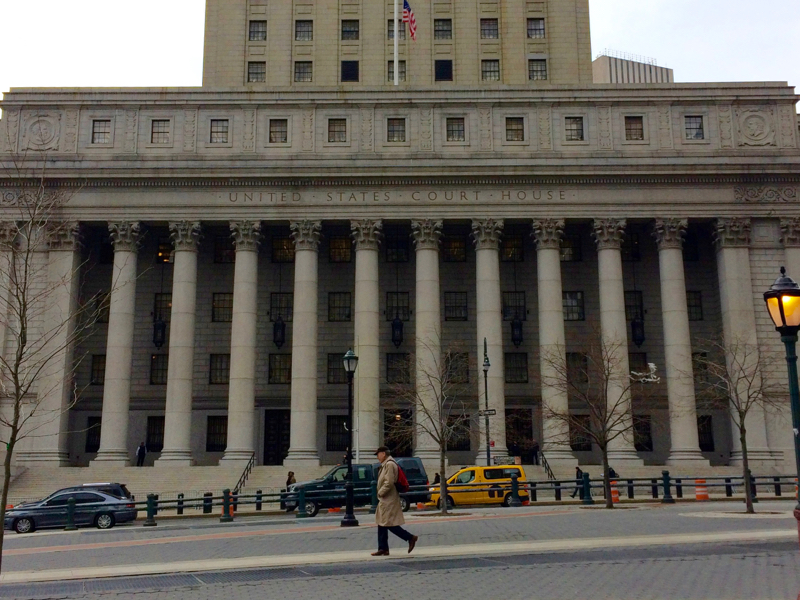Second Circuit ruling essentially permits the U.S. Department of Justice to comply with FOIA at its own discretion.
By Progress New York Staff
In a summary order issued by U.S. Appeals Court Justices Barrington Parker, Peter Hall, and Raymond Lohier, Jr., the U.S. Department of Justice was allowed to withhold documents and records that were shown to exist or were highly likely to exist that were responsive to an open records request filed by the publisher of Progress Queens. Progress Queens is an affiliate of Progress New York.
The three-judge panel ruled that a Plaintiff seeking discovery in order to make a showing of bad faith in litigation under the Freedom of Information Act “must make a showing of bad faith on the part” of the Agency. Improbably, the panel of justices from the U.S. Court of Appeals for the Second Circuit, in circular logic, disregarded claims made by Plaintiff that the District Court improperly denied Plaintiff an opportunity to seek discovery to make the showing of bad faith. By shifting the burden of proof to Plaintiff without Plaintiff having an opportunity to conduct discovery, the Second Circuit justices found that Plaintiff speculated that the Agency holding the requested records, the U.S. Department of Justice, was acting in bad faith. Furthermore, the Second Circuit ruling ignored showings made by Plaintiff during District Court proceedings without the benefit of conducting discovery that Assistant U.S. Attorneys Angela George and Rukhsanah Singh engaged in misconduct, including by withholding information from the Court in violation of professional ethics and by submitting at least one altered document into evidence, misconduct that was documented in ethics complaints filed with regulatory authorities with jurisdiction over each Federal attorney. The Second Circuit, like the District Court, ignored numerous press reports that showed that the Government was engaged in violating FOIA, with the U.S. Department of Justice as the top Agency that the makers of FOIA requests had to litigate in the Courts to compel disclosure of records.
The open records request that was the subject of the Appeal sought records about the Government’s authority to prosecute activists for their activism. In a special investigation, the news Web site Progress Queens published a report, showing that it appeared that the Government was engaged in reclaiming powers to prosecute activists based on their ideology, authority that the Government lost when the U.S. Supreme Court ruled that a “Red scare” law formerly permitting such prosecutions, the Smith Act, was unconstitutional.
U.S. Department of Justice intentionally leaves activists vulnerable to violations of First Amendment rights — without explanation or account of binding legal interpretations
The District Court ruling, which had been appealed to the Second Circuit, rested on a flawed Report and Recommendation issued by Chief Magistrate Judge Roanne Mann, which resolved every controversy in fact during dispositive motion practise in favour of the Party moving for summary judgment, namely, the U.S. Department of Justice, in violation of civil procedure, amongst other errors. Because the Report and Recommendation weakened the applicability of the Freedom of Information Act and the First Amendment, the citizenry lost the ability to use the Courts to bring Agencies into compliance with the Federal open records laws. The outcome of the litigation affirms the legal reasoning admitted by the U.S. Department of Justice during motion practise before the District Court that the Agency could comply with FOIA at its sole discretion.
Before the District Court and the Second Circuit, the publisher of Progress Queens noted that the Government had prosecuted many activists for their activism, including Lt. Daniel Choi ; members of a chapter of ACT UP, the AIDS treatment advocacy group ; and anti-war activists based in the American Midwest, amongst others. In the time since the litigation began, activists have continued to face undue law enforcement scrutiny, including supporters of the Boycott Sanctions Divestment movement, anti-Trump activists, and immigration reform activists, such as Ravi Ragbir.
In the time since the Summary Order was issued, activists have continued to face law enforcement inquiries solely based on their ideology. Last week, the activist and journalist Shaun King was detained at John F. Kennedy Airport by Federal law enforcement agents “as a result of his politics,” wrote Leonard Pitts, Jr., for The Miami Herald. In his interpretation of the events, Mr. Pitts, Jr., wrote that Mr. King’s experience amounted to the Government’s “unsubtle way of letting a critic know that Big Brother is watching.”
By ruling to keep secret the Government’s authority to prosecute activists based on their ideology, Second Circuit Justices Parker ; Hall ; and Lohier, Jr., joined Chief Magistrate Judge Mann and U.S. District Court Judge Joan Azrack in permitting activists to face law enforcement action, including prosecution, solely based on their ideology — without making public the Government’s authority to undertake such actions, despite the Smith Act rulings of the U.S. Supreme Court, the franchise and First Amendment implications to citizens, and the First Amendment consequences to journalists.
Reference Document
- 2018-02-28 Summary Order (Flores v DOJ) [Archive.org]
Recommended Reading
- With sur-reply brief filed, FOIA appeals case over DOJ prosecution of activists awaits oral arguments scheduling [Progress Queens]
- Ethics complaints were filed against Federal prosecutors over alleged misconduct in FOIA lawsuit [Progress Queens]
- Chief Magistrate Judge Roanne Mann was “pouring water on a drowning FOIA” : Court filing [Progress Queens]
- Federal guidelines for the prosecution of activists appear to reconstruct a legal framework lost under the Smith Act [Progress Queens]

